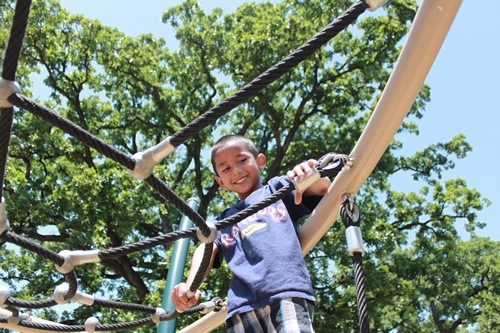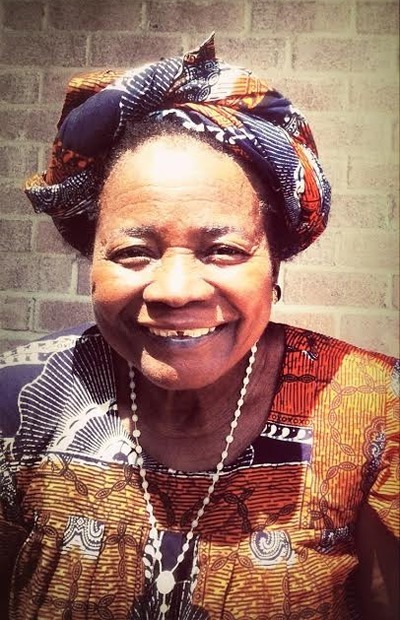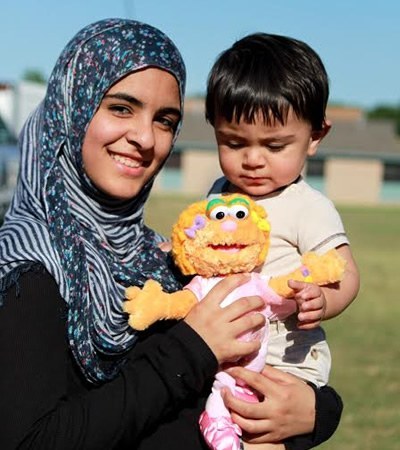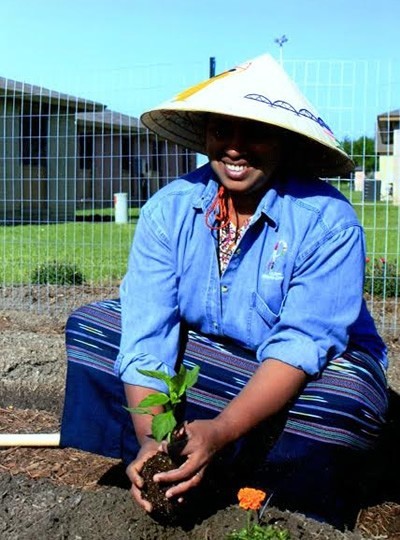Neighborhood of Nations: Exploring
Culture Without Leaving Home
Article and photos by Ashleigh
Bugg

|
|
Manuel from Nepal plays in Trinity
Park, Texas.
|
“The only true voyage of discovery,
the only fountain of Eternal Youth, would be not to visit
strange lands but to possess other eyes, to behold the
universe through the eyes of another, of a hundred others,
to behold the hundred universes that each of them beholds,
that each of them is…” — Marcel Proust
A young woman went one day to the
village elders and told them she wanted to leave her
town to see the world.
“I want to travel. I want to taste
new foods and encounter exotic cultures, to cast myself
into the current of the unfamiliar and savage and strange.
I want to sleep in train stations, run barefoot through
parks, steal food off café tables, and wake up in 100
different cities. I want to conquer the world, to leave
no country left unexplored.”
A great grumbling came from among
the elders, for no one had left that village before.
Finally, the wisest of them came forward and told the
girl: “It will be as you say. You may travel fast and
far through many lands unknown to you. You may see everything
and cross off every experience from your list. However,
when you are finished with these places I want you to
come back and tell me what you have learned.”
The young woman left her village
and went to many different lands. She saw the grandest
sights and wonders of the world. She visited every must-see
tourism destination. However, on certain days when she
was standing in another museum full of priceless works
of art, listening to people speak in a language she did
not know, she realized she was alone and that there was
no one with whom she could talk about her experiences.
She came back home tired and dismayed, believing no one
in her village would understand.
She went to speak to the great elder,
but when she tried to explain the significance of her
solitude and lack of knowledge about the grand things
she had seen, her throat closed up, and she was unable
to speak.
“Come with me,” the elder said and
led her to the other side of the village, a place she
had never visited before. It was a less wealthy side
of town, and it had people who did not look like her,
who had come from other countries and did not speak her
language.
“These people are not like us,”
the members of her village would say. “They’re here to
steal our livelihoods and butcher our traditions.”
The elder left her on the other
side of town with a family very much like her own. She
lived and worked with her host family, and they spoke
to her about their customs and cooked their most marvelous
foods. After a while, she learned to speak to them in
broken phrases, creative hand gestures and many, many
smiles. After a few weeks, she was dancing with them
in their festivals and could recite their history more
clearly than her own. When the month was up the elder
came to see her and asked her about her experiences.
“Dear child,” he said. “You have
seen many wild and wonderful sights this past year. When
did you feel like you had most immersed yourself in the
life and current of travel?”
The young woman thought back to
all she had seen: the grand works of art and palaces
of gold, the mountaintop temples, and rushing rivers.
Finally she spoke: “I felt like I was learning the most
when I was sitting on the floor of the house with my
host mother, sharing a meal, and talking about nothing
in particular.”
The elder smiled and said, “You
have understood well, dear child. For the real voyage
of discovery consists not in seeing new sights, but
in looking with new eyes.”
* * *
“People travel to faraway
places to watch, in fascination, the kind of people they
ignore at home.” — Dagobert D. Runes
It’s 9:00 p.m. on a Thursday, and the
neighborhood is rubbing the sleep from its eyes and casting
off fatigue from another scorching Texas afternoon. Barefoot
children born on the border of Bhutan and Nepal play with
pink bouncy balls in front of their duplexes while Congolese
grandmothers water their gardens of corn and potatoes by
hand. The city of Fort Worth has banned the use of garden
hoses in the face of continuous drought.
Sarah, an elderly woman from Liberia,
is one of the few residents of the apartment complex to
live alone, and she hobbles forward with her walker to call
to the passersby, “God will bless you!” A gap-toothed grin,
teasing and sweet fills her cheeks, masking years of exile
and ache. She must forget the children who disappeared in
the jungles and were replaced by hard men with machine guns.
She has trained her mind not to think of the girls who were
sold like bags of rice and never played in the shade of
childhood. She nods to the Nepali children as they zoom
past in their tiny motorized toy jeep. “God will bless you!”

|
|
Sarah from Liberia gives her
signature grin.
|
Refugees come to Fort Worth, Texas for
various reasons: complicated motives like ethnic cleansing
or genocidal warfare. Political jargon that doesn’t quite
get to the heart of having baby cousins who are missing
limbs from drone strikes or never seeing your mother again
because her application for resettlement didn’t go through.
The apartment complex is made up of over 100 home units;
the U.S. government issued these duplexes to the arrivals,
but they must pay a percentage of the rent. Within a few
months of coming to America, they are expected to have a
job and be on their way to self-sufficiency. They cannot
return to their countries no matter how much they miss their
families or the beautiful landscapes of their past lives.
They are forced to carve out a new home for their children,
knowing this is the opportunity for a world without bombs
and boundaries.
I met my new neighbors after accepting
an internship with an organization that serves refugees
as they assimilate to the United States. In reality, they
were the ones who helped me adjust to the neighborhood.
From the first day, my friends from Nepal were inviting
my partner and me over for elaborate meals and to watch
Texas Ranger baseball games on TV. Nabeha, an Iraqi mother
and former translator for the U.S. army, taught us how to
make dolma and other Arabic specialties while her
young daughter Hanin led us in Justin Bieber sing-a-longs.
During the course of that summer, my partner and I took
the children on field trips to parks and art museums. We
watched the wide Texas sky with a fresh perspective as some
of the Nepali boys saw their first Fourth of July show at
Trinity Park. The boys were mesmerized by the explosion
of colors and chemicals as the fireworks cast bright reflections
over the park’s river. Some of our Iraqi friends gave us
lamb wraps and bottles of Coke, and we settled along the
bank to oohh and ahhh in unison.

|
|
Neighbors from Iraq enjoy a sunny
day in Texas.
|
When people visualize Texas they see
ten-gallon hats and cowboys herding steers across dusty
trails. They don’t see teenagers from Burundi in bright,
patterned skirts singing in Swahili or Burmese women with
rice paddy hats working in the garden. They don’t see Iraqis
celebrating the wedding engagement of their daughters or
hijabs mixed among the ball caps and cowboy boots. Even
though native Texans may not notice at first, the peoples
of the nations are coming to their neighborhood.

|
|
A Burmese woman plants flowers
in Fort Worth.
|
For my partner and me, it was a summer
of celebration and survival. We learned about family, resilience
and how to move forward no matter the obstacle: whether
it was tricky English words or stacks of government paperwork.
People from over 15 countries lived together in one tiny
complex. They came from different walks of life and social
situations. Some like my Iraqi neighbors came from large
two-story homes with fruit orchards. Others from Bhutan
were raised in camps along the border and never had plumbing
or utilities. Some were completely fluent in English; others
had never learned to read or write in their native tongue,
much less ours. It was an adjustment for all, learning the
everyday rituals of life in inner city Fort Worth. A new
language was born as children who spoke five different dialects
incorporated urban Texas slang with local village vernacular. Y’all was
heard in the same conversation as As-Salaam-Alaikum.Namaste was
incorporated with a joke about Taylor Swift. The Congolese
grandmothers mixed up a giant pot of cassava and folk stories,
and everyone was given a spoonful.
The hospitality of this mini United
Nations huddled in the heart of cattle country is unparalleled.
When Americans or neighbors of different nationalities come
to visit, they are treated like honored guests. Large trays
of Arabic delicacies, Ethiopian flat bread, or Nepali spiced
tea are presented to visitors on literal silver platters.
Every family serves differently, but they always share their
best. Time slows and settles in to stay awhile as the children
play in the street and visitors sit with people from Eritrea,
Pakistan, and Rwanda and talk about the weather or their
families back home. Life can be slower, but it’s also felt
more intensely. My neighbors are the ones who know the exact
price of peace.
Sometimes people spend thousands of
dollars on travel or volunteer experiences to engage directly
with different cultures. They want to try new things. They
want to give back. Yet, we don’t always realize there are
nations of dreamers in our backyards: struggling and surviving,
dealing with culture stress and PTSD, navigating the nuances
of a new place. They work hard for a future that is uncertain,
missing a past that cannot be replaced. These beautiful
and resilient huddled masses are mapping out the true definition
of the American Dream. They share what they’ve learned with
anyone who is open to listening to languages without words
and seeing lands with new eyes.
As my young neighbor from Nepal might
put it, “the light within me respects the light within you.
Namaste, y’all.”
Ashleigh Bugg has
studied and worked in Costa Rica, Nicaragua, Slovakia, Virginia,
and Texas. She is currently working on a project with the
Roma Press Agency of Slovakia to raise funds to produce
a documentary about human trafficking in Roma communities.
Learn more on Ashleigh's blog.
|
